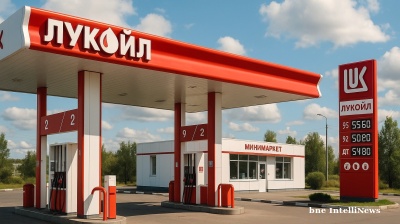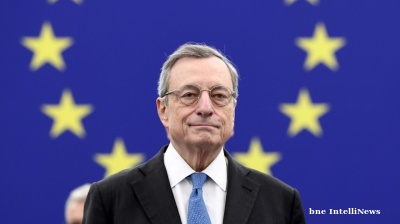Robert Fico, Slovakia’s incoming premier, has made international headlines with his pledge to stop supplying neighbouring Ukraine with arms, raising fears that he will join Hungary’s strongman Viktor Orban in obstructing the European Union’s attempts to help Ukraine defend itself against Russian aggression.
“I informed the chairwoman of the EC that the new Slovak government won’t support Ukraine militarily and that we are focusing only on humanitarian aid,” the Smer party leader wrote in a Facebook post after his first meeting with European Commission President Ursula von der Leyen last month headlined “From today onwards Slovakia will have its own opinion in Brussels”.
Yet the government’s new stance appears to be largely aimed at domestic consumption, while at the same time it is starting to mull the opportunities for doing business with its big neighbour once Kyiv rebuilds – not least the potential contracts for Slovakia’s once mighty defence industry.
“Fico will not stop his business backers from making money by supplying Ukraine,” says Milan Nic, senior fellow at the German Council of Foreign Relations (DGAP).
Up until now, Slovakia was one of the staunchest backers of Ukraine per capita. Despite having one of the smaller Nato armies, it was among the first to send major former Soviet offensive weapons such as fighter jets (MiG-29s) and T-72 tanks, as well as a S-300 air defence system and its own Zuzana howitzers.
Fico had promised to end this support, arguing, like Orban, that it just stokes the ongoing war, and he has instead called for immediate peace talks.
Fico, a former Communist party member, has long been sympathetic to Russia and critical of the US. He even attended a congress of Russian dictator Vladimir Putin’s United Russia party in 2011 – the only EU politician to do so – where he said there could not be a “fully fledged Europe“ without Russia.
After Russia’s invasion of Crimea and the Donbas in 2014 Fico criticised Western sanctions and blamed “Ukrainian fascists” for the outbreak of hostilities.
Before this September’s election, he exploited fatigue with the war, calling for peace talks now, and vowed not to send “a single more bullet” to Ukraine.
Brutal financial support
Soon after winning the election and being nominated as the country’s next premier, Fico reiterated his opposition to further sanctions – if they harm Slovak interests – and called for an immediate end to the fighting, telling a parliamentary committee ahead of last month’s EU summit that there could be no military solution to the war and that the EU "should change from an arms supplier to a peacemaker”.
He also slammed Ukraine for corruption – despite his last government collapsing in graft scandals – and demanded better checks on how EU money is spent.
"Ukraine is among the most corrupt countries in the world, and we condition its brutal financial support on guarantees that European money (including Slovak money) will not be embezzled and that part of these resources will be used to restore Slovak infrastructure in border areas and to support Slovak companies in the restoration of Ukraine," Fico said on October 30 after the EU summit.
With the summit safely behind him, on November 8 Fico took the opportunity to axe the 14th round of Slovakian military aid to Ukraine prepared by the outgoing technocratic caretaker cabinet.
The previous centre-right governments had already delivered the bulk of the heavy arms in the state warehouses, but the axed military aid package, worth €40mn, would still have been useful, according to former defence minister Jaroslav Nad. It consisted of 4mn pieces of 7.62mm ammunition, 5,172 pieces of large artillery calibre 125mm ammunition, 140 missiles for anti-air defence system Kub, eight missile launchers and 1,200 mines.
“With great pleasure, I can announce that the whole cabinet unilaterally rejected [the] sending of these weapons and ammunition to Ukraine,” Fico commented in a video message posted on his Facebook, which he uses as his personalised online streaming channel.
“We are clearly demonstrating that we prefer sending humanitarian aid to Ukraine and that sending supplies of weapons and ammunition from state stocks has ended,” Fico said.
Yet at the summit beforehand, Fico had not made any significant attempt to block EU aid to Ukraine or further sanctions on Russia, and his government looks unlikely to join with Orban in any obstruction, at least for the moment.
Foreign Minister Juraj Blanar, a Smer MP with no foreign policy experience, said at the weekend that Smer is “open” to discussing the latest €50bn EU aid package to Ukraine, “so long as these resources are used for concrete purposes and do not get lost in the corrupt environment of this country”, and so long as Slovak farmers are protected from cheap Ukrainian imports and Slovak companies can participate in the reconstruction of Ukraine.
Performative actions
Even more significantly, Fico has repeatedly stated that he would not be against Slovak arms companies selling materiel to Kyiv privately.
“If a company wants to manufacture weapons and deliver those, then we won’t prevent this, of course,” Fico said at a press conference following a meeting with his right-hand man, Robert Kalinak, the new minister of defence, on November 6.
This all suggests that Fico’s opposition to military aid is mainly performative, and, unlike Orban, he may not have serious ideological objections to supporting Ukraine, particularly if Slovakia, or at least his party, could potentially gain from this. Fico would probably only join Orban in obstructing EU aid if he were already in a serious dispute with the Commission on another issue, for example, his drive to re-establish control over the country’s judicial system in order to prevent any further corruption investigations.
Moreover, Slovakia could gain significantly from supplying Ukraine as it has a strong defence tradition. During the Cold War, Slovak industrial plants hidden deep in the Carpathian mountains were a key supplier of heavy arms such as tanks to the Warsaw Pact armies. This industry collapsed after the re-establishment of democracy in 1989, and Slovak bitterness over this helped fuel the division of Czechoslovakia in 1993.
Now Slovak defence companies are prospering again. According to data from the FinStat portal, the 10 largest weapon companies in Slovakia had combined sales of more than €362mn. The majority of the sales were registered by the state-owned DMD Group, which includes Konstrukta-Defence and ZTS Special, and MSM Group, which is part of the Czechoslovak Group (CSG).
CSG is a key ammunition producer in Slovakia through its shareholdings in ZVS Holding, which produces 150 mm calibre ammunition, and VOP Novaky. It has prospered from supplying big calibre ammunition, land systems, tanks, IFC, rocket launchers and artillery to Ukraine. Owner Michal Strand, son of the founder, this year joined the Forbes list of Czech billionaires.
These defence companies are now ramping up production. While Slovakia’s ammunition production averaged 50,000 rounds this year, it is poised to produce 100,000 to 150,000 rounds next year, says Alexander Duleba, a senior fellow at the Slovak Foreign Policy Association.
The Smer party has good reasons for facilitating these defence contracts as it has close links with Slovak defence companies, led by MSM Group.
Vladimir Snidl, a defence journalist at DennikN daily, told bne Intellinews that Fico “does not have a means to an end the contracted supplies” to Ukraine, and, moreover “he is not interested” in doing so.
Snidl points out that the new Minister of Defence Robert Kalinak has “good ties” with Jaroslav Strnad, founder of CSG. “I expect him [Kalinak] to be very open towards CSG,” Snidl says.
The Zuzana artillery system supplied to Ukraine is a product of Slovak state company Konstrutka Defence. Konstrukta’s head, Alexander Gursky, who has been active in backing Ukraine and has good contacts there, has already resigned and will be replaced by a Kalinak nominee.
Going forward, these potential deals for Smer’s business backers look likely to outweigh any concerns Fico may or may not have about stoking the Russia-Ukraine conflict.
“Fico is a political animal. He understands power and money. He does not have an ideology that would justify any dramatic changes,” says Duleba.
Features

US expands oil sanctions on Russia
US President Donald Trump imposed his first sanctions on Russia’s two largest oil companies on October 22, the state-owned Rosneft and the privately-owned Lukoil in the latest flip flop by the US president.

Draghi urges ‘pragmatic federalism’ as EU faces defeat in Ukraine and economic crises
The European Union must embrace “pragmatic federalism” to respond to mounting global and internal challenges, said former Italian prime minister Mario Draghi of Europe’s failure to face an accelerating slide into irrelevance.

US denies negotiating with China over Taiwan, as Beijing presses for reunification
Marco Rubio, the US Secretary of State, told reporters that the administration of Donald Trump is not contemplating any agreement that would compromise Taiwan’s status.

Asian economies weigh their options amid fears of over-reliance on Chinese rare-earths
Just how control over these critical minerals plays out will be a long fought battle lasting decades, and one that will increasingly define Asia’s industrial future.




